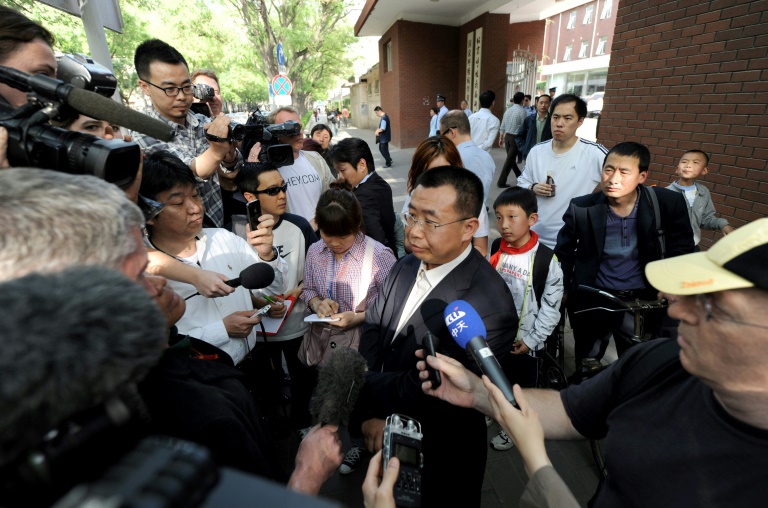A prominent Chinese human rights lawyer whose case has attracted international concern confessed Tuesday to "inciting subversion of state power" in what Amnesty International called a sham trial.

Jiang Tianyong, 46, sat in court in the southern city of Changsha as he told the judges he was “ashamed”.
Jiang had taken on many high-profile cases, including those of Falun Gong practitioners, Tibetan protesters and victims of the 2008 contaminated milk powder scandal before being disbarred in 2009.
His family has not had contact with Jiang since his sudden disappearance on November 21 en route from Beijing to Changsha, where he had gone to inquire about detained human rights lawyer Xie Yang.
Xie was detained in the “709 crackdown” of July 2015, and his claims of being tortured in custody, which Jiang helped to publicise, prompted international concern.
Authorities in that crackdown detained more than 200 people, including lawyers who took on civil rights cases considered sensitive by the ruling Communist Party.
Xie was found guilty of “subversion of state power” and released on bail in May after what critics described as a show trial.
Jiang told the court on Tuesday that he “deliberately fabricated torture details of Xie Yang while he was in police detention and played to western media’s taste, aiming to tarnish the image of the government”.
“I know what I did was wrong, it is a serious crime,” Jiang said in video clips of the trial posted on the official microblog of the Changsha Intermediate People’s Court.
Authorities did not inform family members of the trial date, said Jiang’s wife Jin Bianling, who currently lives in the US, where she fled in 2013 to escape harassment from Chinese authorities.
“The trial is a choreographed script,” she told AFP.
Calling the trial a “sham”, Amnesty International China researcher William Nee said Jiang’s treatment “epitomises many of the worrying aspects of the lawyers’ crackdown”.
Nee said this included the “harassment of family members, not letting the accused access their lawyer, prosecution based on charges that don’t comply with international standards, blocking the public from attending, all while presenting the trial as real on social media”.
Jiang’s arrest is part of a tightening of controls on civil society that began in 2012 when President Xi Jinping took power.
While the government initially targeted political activists and human rights campaigners, it has increasingly turned its attention to the lawyers who represent them, closing avenues for legal activism that had opened up in recent years.
Jiang’s trial ended Tuesday afternoon, and the court said in an online statement that it would release the verdict at a later date.
– Retaliation? –
In the years leading up to his detention, Jiang had repeatedly met foreign officials and politicians, including high-ranking visitors from the US, to discuss China’s human rights situation.
The United Nations Special Rapporteur on extreme poverty and human rights, Philip Alston, has said he feared Jiang’s previous disappearance was in part retaliation for the lawyer’s assistance to UN experts.
In written testimony to the US Congress in May, Jin said her husband’s troubles began after he addressed the legislature during a visit to America in October 2009.
Jiang was placed under house arrest the following month, during a visit by then-US president Barack Obama to China, she said.
In the years since then he had repeatedly been detained and beaten by police, she added.

Chinese rights lawyer Jiang Tianyong (C) speaking to foreign media in May 2012 outside the Chaoyang hospital in Beijing, where blind activist Chen Guangcheng was believed to be getting a check up
“The long-term harassment and threats consumed me. I even thought of suicide,” she wrote, adding that police were also following his parents.
There are fears the outcome of Jiang’s case is predetermined, with several state media outlets previously reporting he has “confessed” to a variety of alleged crimes.
In March state broadcaster CCTV aired a video of Jiang, in which he said he had fabricated stories of human rights abuses to curry favour with Western media.
Support Local Journalism
Add The Citizen as a Preferred Source on Google and follow us on Google News to see more of our trusted reporting in Google News and Top Stories.






